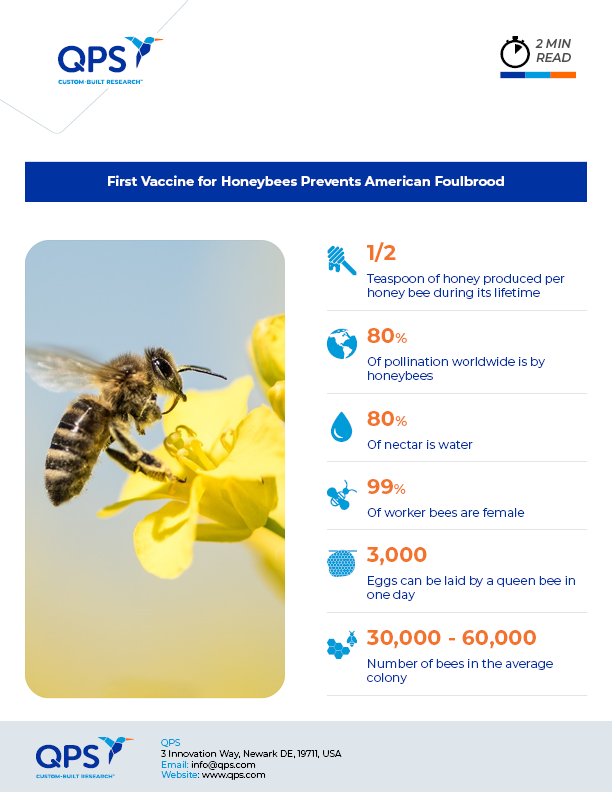A healthy honeybee population is a critical component of healthy ecosystems, clean air, and stable soil. Honeybees also play a critical role in food production, providing an astonishing estimated $15 billion in crops annually in the United States alone. So the rapid decline in the honeybee population, which has been plummeting since 2006, has been a cause of serious concern. One reason behind declining honeybee numbers is the proliferation of infectious diseases like American foulbrood, a highly infectious and deadly bacterial disease that affects honeybee larvae. Early this year, the USDA granted conditional approval for an American foulbrood vaccine. This vaccine, the first ever approved for an insect in the United States, may represent a promising step forward in protecting honeybees and other pollinator populations.
The Honeybee Population Crisis
Honeybees are a vital part of the agricultural ecosystem in the United States. By feeding on pollen and nectar, honeybees are responsible for pollinating about one-third of the food crops in the United States.
The declining honeybee population has been a concern since honeybee numbers began to decrease in 2006. But in recent years, the decrease in the honeybee population has become a genuine crisis, with hives numbers plummeting at a rate and acceleration not previously observed. Between April 2017 and April 2018, in the United States alone, beekeepers reported an estimated loss of 40 percent of their colonies in a single year.
Expert campaigns to “save the bees” have generally focused on the four known causes of honeybee death: poor nutrition, pesticides, parasites, and pathogens. One pathogen known to be responsible for significant honeybee death is Paenibacillus larvae, the spore-forming bacterium responsible for American foulbrood, a deadly and infectious bacterial disease fatal to honeybees.
American Foulbrood Vaccine: A First
Deadly and infectious in honeybee populations, the bacterial infection known as American foulbrood decays honeybee larvae, and infected hives give off a foul, rotting smell – the disease’s namesake. American foulbrood can spread not only from bee to bee but also through contaminated equipment and beekeepers. And because the spores of the bacterium can survive for many years, once a hive becomes infected with the disease, it becomes extremely difficult to eradicate. The disease can easily decimate a colony of 60,000 bees.
Until the recent approval of the American foulbrood vaccine, the only treatment options available have been to burn infected colonies (and all of the associated equipment) or to use antibiotics. But these options have limitations. As Chris Hiatt, a beekeeper in North Dakota and California and president of the American Honey Producers Association, explains, “For beekeepers, you just don’t want to be reliant on antibiotics.” As in humans, frequent antibiotic administration can also destroy beneficial microbes over time.
But until recently, it was not clear how else to treat or prevent the disease. Scientists previously believed that insect vaccines could not be effective because it was assumed that insects’ lack of antibodies meant they could not acquire immunity. And even once scientists understood that insects were, in fact, capable of acquiring and passing immunity on to their offspring, they didn’t understand how.
That changed in 2015, thanks to a study published by a team of researchers led by Dr. Dalail Freitak, associate professor in honeybee research at the Karl-Franzens University of Graz in Austria and chief science officer for Dalan Animal Health, a biotech company in Georgia. Their research identified the specific protein (vitellogenin) responsible for prompting an immune response capable of passing from adult insects to their offspring. Critically, Freitak and her team learned they could cultivate immunity in an entire bee population through a single queen.
The ultimate result of that research has been the development of a prophylactic vaccine to protect honeybees from American foulbrood. Dalan Animal Health developed the vaccine, which was granted conditional approval by the USDA earlier this year. The vaccine is administered by incorporating it into royal jelly, the sugar fed exclusively to queen bees. The vaccine is then deposited in the queen bee’s ovaries, and immunity is passed to developing larvae as they hatch.
With this landmark vaccine approval, researchers in the field are hopeful that this breakthrough will lead to the development of vaccines that target other diseases currently affecting honeybees. The ultimate goal continues to be slowing the decline in the honeybee population.
QPS is a CLIA-certified GLP- and GCP-compliant contract research organization (CRO) delivering the highest grade of discovery, preclinical and clinical drug research development services. Since 1995, it has grown from a tiny bioanalysis shop to a full-service CRO with 1,100+ employees in the U.S., Europe and Asia. Today, QPS offers expanded pharmaceutical contract R&D services with special expertise in neuropharmacology, DMPK, toxicology, bioanalysis, translational medicine and clinical development. An award-winning leader focused on bioanalytics and clinical trials, QPS is known for proven quality standards, technical expertise, a flexible approach to research, client satisfaction and turnkey laboratories and facilities. Through continual enhancements in capacities and resources, QPS stands tall in its commitment to delivering superior quality, skilled performance and trusted service to its valued customers. For more information, visit www.qps.com or email info@qps.com.








